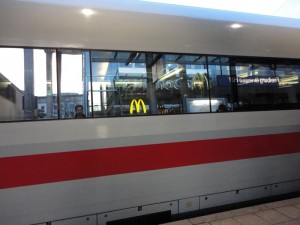This morning I am on a train headed to Frankfurt to catch my flight home. I have thoroughly enjoyed the last two days, but I have been busy! The propose of this trip was to meet with our colleagues at the Albert-Luswigs-Universität Freiburg to discuss future joint programs and the development of an honors-type program. The schedule kept me moving from the moment I landed in Basel to late each night.
Wonderful Hindbeernkuchen I had for lunch when I arrived. O! So good!
The last time I was in Germany, other than in an airport flying through, was in 1988. I had taken a year off from college between my freshman and sophomore years and attended a Goethe Institut in Schwäbisch Hall, not terribly far from Freiburg. One of my great regrets is that I have never become fully fluent in German and it has been too long. I was surprised, however, at how much I did remember. Could understand most conversations and most that I read (reading the academic articles have helped in that regard) but when I came to formulate a responses, my vocabulary was lacking.
These two days have been, as I said, incredibly busy, but also very draining in an energetic way. In order to be useful in my consultation I had to learn as much as I could as quickly as possible about the current German system of higher education since the Bologna Process, particularly at Freiburg, and as much again about the system before Bologna. The structure is quite different. Like Oxford they have Faculties rather than colleges and students enroll directly into a program of study, there are no “general education” courses and little in the way of what we would call electives. Their course of study is three years long but all (if one is going to have anything like a management position) are expected to do a two year masters program following.
What is happening across Europe is now a desire to return to a liberal arts style of curriculum, something that we take for granted at Penn State. The Netherlands have led the way with a number of universities now having “Univeristy Colleges” that are four year programs designed to expose students to truly interdisciplinary approaches to thought and research. One aspect that I found surprising is that almost all of these programs are taught excessively in English.
One overwhelming feeling I have after my time is one of gratitude. We are very fortunate to have such a strong educational program at Penn State that places an emphasis upon literacy, numeracy, and global perspective. And we are able to do this, by and large, for all students, even those in fields that require very directed programs of study such as engineering. We are not perfect by any measure and I am encouraged to continue to develop our own programs at Penn State so that they are not just for the benefit of our PLA and SHC students.

The train that begins my journey home. Where’s Waldo?
Location:A train, somewhere in Germany






4 thoughts on “Freiburg and home”
Oh, yes, the Bologna process! First set of graduates to go through Bologna in Romania had yours truly in it. The problem was that we graduated with the people that were doing 4 years and that felt awkward. The educational system in Europe is somewhat strict in the idea of no general education classes, however, one important piece of the puzzle, which you didn’t mention, is high school. While different throughout the continent, this stage is the one where the emphasis on a broad education comes into play. I took 16 different classes in one year (year-long, not semester-long) in a limited but wide range of selection (as in we barely had any choice, but the field was quite large).
Have a safe trip back.
P.S.: I hope you’re not on Lufthansa; the customer service on board is horrendous.
Thanks! I actually arrive last night and only posted it this morning.
You are certainly right that the European expectation is that the high school years form the broader grounding in a more “liberal” education. Yet I don’t think it is much broader than the high school education our students receive here in the States. The concern expressed by the European educators in articles I have read and with whom I talked is that European schools are simply falling (further) behind US schools in developing students for the knowledge economy. (This is a summation of their concerns, not my evaluation of their system.) Thus the development of liberal arts and sciences colleges.
On the high school aspect, I speak from experience. Most American HS students take 1 science class, whereas ALL Romanian students take at least 2 or 3 year-long of each of the sciences (2 or 3 biology, 2 or 3 chemistry, 2 or 3 physics) and this is the minimum. Students like me in natural sciences classes took 4 of each. On top of that, 4 classes of history, 4 of geography, 4 of math (at different levels for those in humanities) and the list goes on. During my year in the USA I got to build my own curriculum, mostly to my liking, and looking through my friends’ schedules, they had much less “stuff” to take. In fact, I came over as a sophomore and because of the large number of credits I had, I was enrolled as a senior and actually graduated High School in the US, two years early. (I then went back to Romania and did 11th and 12th grade like everybody else)
Now I have to make sure I say this: what I’ve just said, in no way, ever, makes a case for why the European systems, and the Romanian system in particular, are superior to the American one. On the contrary, I am shocked by the ideas of my American colleagues that claim that the US is struggling severely in education and that it is, in fact, running behind. The constant flow of foreign students from college upwards should be a good counterexample.
Either way, the fact that transatlantic connections are made is something that I’m excited about. If not for me, then for future generations to benefit from the best of the best wherever they may want to study. 🙂
As I am curious the development of liberal arts and science colleges in Europe since I am part of the founding class of the Amsterdam University College and as I used to go to school in Freiburg, I was reading your blog. One thing was striking me : The liberal arts and science programs in the Netherlands are exclusively three year programs, not four year programs as you said. In Europe – in Freiburg as well – one should regularly graduate at the Masters level in five years.